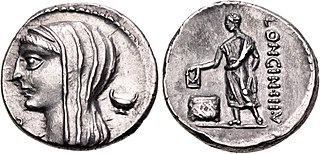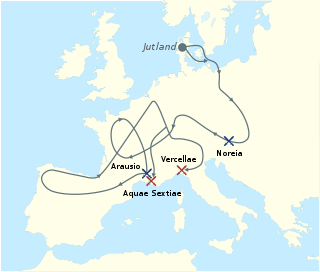
Year 273 (CCLXXIII) was a common year starting on Wednesday of the Julian calendar. At the time, it was known as the Year of the Consulship of Tacitus and Placidianus. The denomination 273 for this year has been used since the early medieval period, when the Anno Domini calendar era became the prevalent method in Europe for naming years. The year also saw most lost territories to rebellion returned to the Roman Empire by Emperor Aurelian.
Year 96 BC was a year of the pre-Julian Roman calendar. At the time it was known as the Year of the Consulship of Ahenobarbus and Longinus. The denomination 96 BC for this year has been used since the early medieval period, when the Anno Domini calendar era became the prevalent method in Europe for naming years.

The gens Cassia was a Roman family of great antiquity. The earliest members of this gens appearing in history may have been patrician, but all those appearing in later times were plebeians. The first of the Cassii to obtain the consulship was Spurius Cassius Viscellinus, in 502 BC. He proposed the first agrarian law, for which he was charged with aspiring to make himself king, and put to death by the patrician nobility. The Cassii were amongst the most prominent families of the later Republic, and they frequently held high office, lasting well into imperial times. Among their namesakes are the Via Cassia, the road to Arretium, and the village of Cassianum Hirpinum, originally an estate belonging to one of this family in the country of the Hirpini.
Cassius Longinus may refer to:
Junia Lepida was a Roman noblewoman who lived in the first century. She was the second daughter of Aemilia Lepida and Marcus Junius Silanus Torquatus, one of the Junii Silani. Her maternal grandparents were Julia the Younger, granddaughter of the emperor Augustus, and Lucius Aemilius Paullus, consul in AD 1.
Lucius Cassius Longinus may refer to:
Marcus Statius Priscus Licinius Italicus was a Roman senator and general active during the reigns of Hadrian, Antoninus Pius, and Marcus Aurelius. Contemporary sources refer to him as Marcus Statius Priscus or simply Statius Priscus. He was consul for the year 159 as the colleague of Plautius Quintillus; Priscus was one of only two homines novi to attain the ordinary consul in the reigns of Antoninus Pius and Marcus Aurelius.
Lucius Cassius Longinus Ravilla was a Roman consul in 127 BC.
Lucius Calpurnius Piso Caesoninus was the son of Lucius Calpurnius Piso Caesoninus, consul in 148 BC.
Lucius Cassius Longinus was consul of the Roman Republic in 107 BC. His colleague was Gaius Marius, then serving the first of his seven consulships.
Gaius Cassius Longinus was a Roman consul in 73 BC.
Lucius Gellius Poplicola or Publicola was a Roman politician and general during the final years of the republic. He was consul in the year 36 BC, and was the grandson and adopted son of Lucius Gellius, who had been consul in 72 BC.

Gaius Cassius Longinus was a Roman consul in the year 171 BCE, together with Publius Licinius Crassus. He was probably praetor urbanus in 174 BC.
Marcus Vinicius was twice Roman consul and, as husband of Julia Livilla, grandson-in-law (progener) of the emperor Tiberius. He was the son and grandson of two consuls, Publius Vinicius and Marcus Vinicius.
Gaius Cassius Longinus was an Ancient Roman jurist and politician from the first century AD. A grandnephew of Servius Sulpicius Rufus, he was also a nephew or great-grandson of Gaius Cassius Longinus, one of Caesar's assassins. Longinus was suffect consul of the second half of the year 30 as the colleague of Lucius Naevius Surdinus.
Lucius Pedanius Secundus was a Roman senator of the first century. In AD 43, during the reign of Claudius, he was consul suffectus from the Kalends of March to the Kalends of July, together with Sextus Palpellius Hister. Secundus was the first senator from the Spanish provinces to achieve the rank of consul since the anomalous tenure of Lucius Cornelius Balbus in 40 BC.
Lucius Cassius Longinus was a Roman senator, who was active during the reigns of Tiberius and Caligula. He was ordinary consul in the year AD 30 with Marcus Vinicius as his colleague. Longinus came from an ancient and noble gens, the Cassii. He is best known as the first husband of the Emperor Caligula's sister Julia Drusilla, whom he married in 33.

The Battle of Burdigala was a battle of the Cimbrian War that occurred in the year 107 BC. The battle was fought between a combined Germanic-Celtic army including the Helvetian Tigurini under the command of Divico, and the forces of the Roman Republic under the command of Lucius Cassius Longinus, Lucius Caesoninus, and Gaius Popillius Laenas. Longinus and Caesoninus were killed in the action and the battle resulted in a victory for the combined tribes.
Marcus Cornelius Cethegus was a Roman statesman in the first half of the 2nd century BC. He was elected consul in 160 BC, in which position he served alongside Lucius Anicius Gallus.
This page is based on this
Wikipedia article Text is available under the
CC BY-SA 4.0 license; additional terms may apply.
Images, videos and audio are available under their respective licenses.
![]() This article incorporates text from a publication now in the public domain : Smith, William, ed. (1870). "Longinus, Cassius (7)". Dictionary of Greek and Roman Biography and Mythology . 2. p. 799.
This article incorporates text from a publication now in the public domain : Smith, William, ed. (1870). "Longinus, Cassius (7)". Dictionary of Greek and Roman Biography and Mythology . 2. p. 799.


